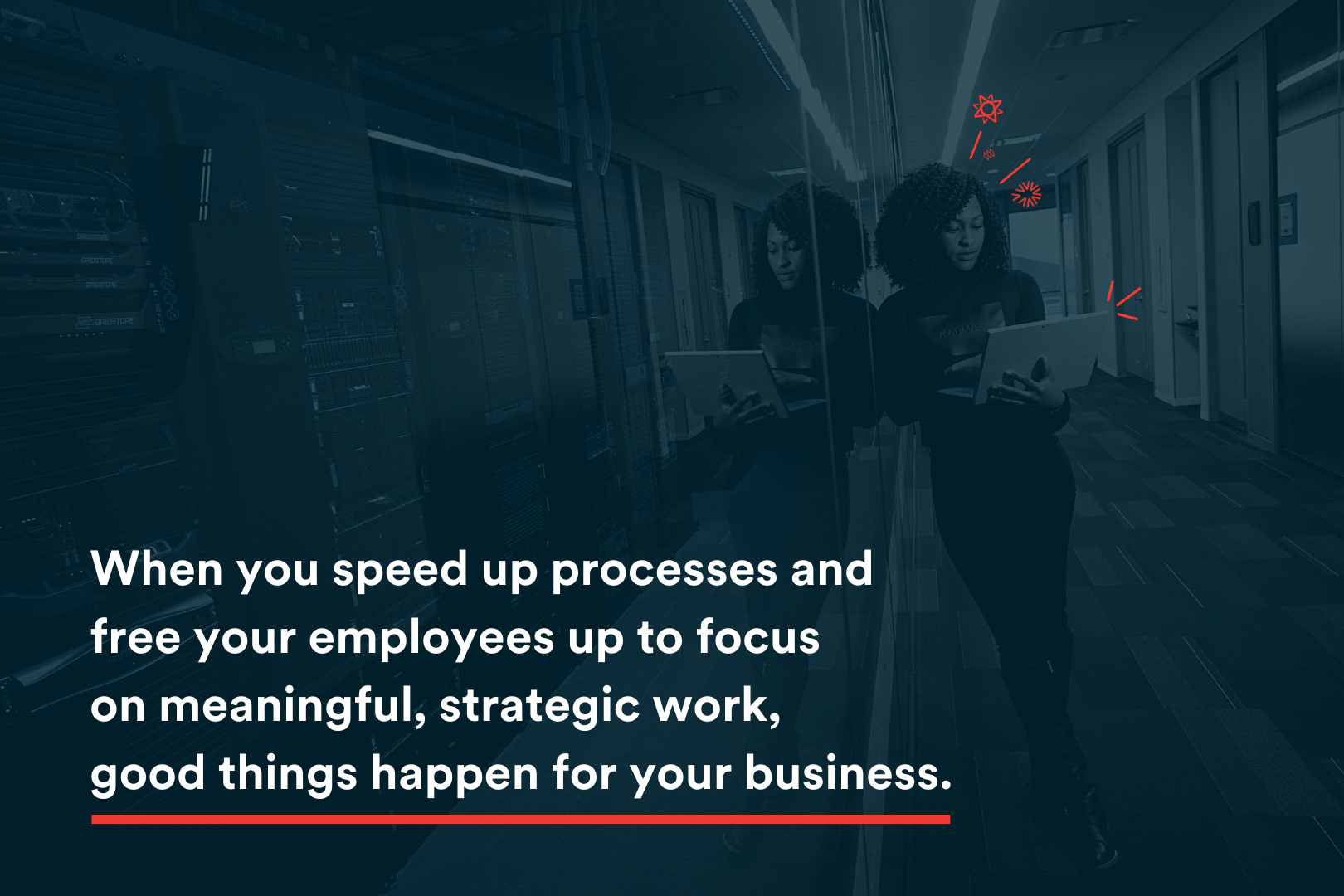big data | data strategy | automation
Every manual task is an opportunity missed.
As our Chief Technology Officer explained in a recent article, even complex tasks such as coding have evolved to a point where certain processes can be offloaded to machine learning applications and artificial intelligence. Human beings, especially highly skilled ones, certainly aren’t being replaced; instead, their own occupations are transforming to encompass more creative, innovative pursuits that current algorithms can’t achieve.
Every industry right now is taking a hard look at their operations and determining what can be optimized by letting machine learning do the heavy lifting of manual labor, thus speeding up processes while also enabling top talent to create brand new ways of doing business.
One area where this is abundantly clear is in data collection. Long gone are the days when inputting data and extracting information from the data was a matter of plugging away at an Excel spreadsheet and laboriously poring over the information to extract key insights.
Today, all points of data can be recorded, distributed, and stored (in either a data lake or a data warehouse) as part of a process that’s fully automated. Once stored, the data can remain in perpetuity until such time that intelligent analysis occurs and the data can be put to good use for your business.
If you’re still unsure about whether or not now is the right time to embark on a data automation project, we’re going to highlight the three key reasons why automating data collection is more important now than ever: speed, labor, and innovation.
Speed
One of the standout features of any machine learning application is its ability to speed up processes that once would have taken grandiose amounts of time. And that’s if the data stream was small enough that it could even be completed at all.
Data automation ensures that key customer and/or user touchpoints are recorded and added to a pool of similar or even dissimilar data. Once the applications have been set up with the proper parameters and the appropriate storage methods, it’s possible to take a “set it and forget it” mentality. The data will be there, in the right space, ready to bring value to your business.
Let’s take a look at a few ways in which this automation speeds up processes, starting with customer support.
Let’s say you’re a business that owns and operates a 24/7 customer support line, the type we all know and love, with that friendly message that tells someone, “Your call may be monitored for quality assurance” or “Please stay on the line to take a survey at the end of this call.”
Now, in the past, if you wanted to get anything fruitful from those conversations, those recordings would have to be played back by someone who would type out what was said and put it into a database with similar conversations, where it could be carefully curated by a team of analysts in order to deduce potential areas of improvement.
But when those recordings can be automated, and the data extracted based on keywords, resolution type, and survey results, the speed at which you can analyze this data to find areas of improvement increases dramatically. You don’t need to play back the transcript or write down the survey result, because a machine learning application does it for you.
Labor
Imagine, for a moment, how labor-intensive a tool like Spotify would be if it relied on the manual collection of data.
Spotify would need to employ a veritable army in order to monitor and input what artists people are listening to, where those people are located, what devices they listen on, what times of day, etc.
When considered in this light, it’s clear that many modern applications simply wouldn’t exist without the automation of data collection. Facebook, just to name another example, would not work if an actual human had to monitor what each and every user was up to (not to mention the privacy implications of such a system).
It doesn’t take one of the biggest and most well-known companies on the face of the planet, however, in order to experience the labor benefits that arise from the automation of data collection. Think of a restaurant with an online ordering system that negates the need to have someone answer the phone and that can track orders to see what’s selling well or what’s not. Or a local contractor that automates the estimation, hiring, and billing processes. Or the HR branch of a mid-size company that uses automation to track applicants and maintain a database of qualified individuals.

There’s truly no end to the processes that can be improved by automating data collection, saving hours and hours of labor.
And to those worried about how data collection can eliminate jobs, it turns out that the opposite is usually true. Removing the data collection process from the purview of employees frees highly skilled individuals to conduct more fulfilling, top-of-training work. They can explore previously unavailable avenues that open up new inroads for your organization. And that leads right into perhaps the biggest benefit from automation.
Innovation
When you speed up processes and free your employees up to focus on meaningful, strategic work, good things happen for your business.
The automation of data collection, and the ensuing insights that arise from having the data in a lake or warehouse you can access and deploy at will, opens your business up to new untapped opportunities. You begin to see the patterns and conclusions that emerge from a large pool of data. You can make adjustments to your business operations accordingly and even seek out new paths to revenue that may have gotten put on the backburner, if they were to arise at all.
For companies like the aforementioned Spotify and Facebook and so many others, data is their true business model. It provides the business intelligence necessary to test and launch new products, to shutter those that aren’t performing, and to reconfigure operations to best serve customers while creating exponential growth.
The time saved and the ideas generated from the automation of data collection is innumerable. The sky is truly the limit.
If you’re ready to experience innovation and automate your data collection processes, contact Aviture to learn more about how to get started and what doing so could mean for your organization.





